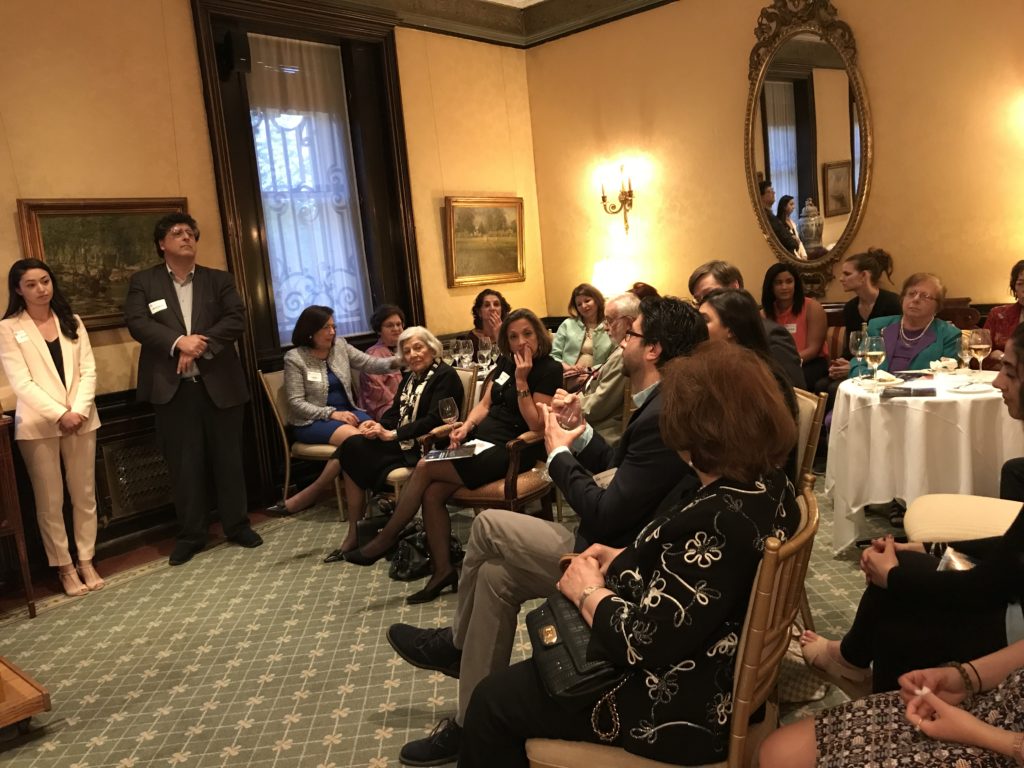CAMBRIDGE, Mass.—Challenges and successes in advancing equal rights for Armenian women drew an attentive audience at a recent reception on “Empowering Armenian Women” at the Cosmos Club in Washington, D.C., sponsored by the National Association for Armenian Studies and Research (NAASR) on April 26, and hosted by Judith Saryan of Cambridge, Mass. and Arlene Saryan of Washington, D.C.

Sarah Ignatius, Executive Director of NAASR, welcomed the many women leaders in the room, as well as the men, and explained that the Cosmos Club was the perfect setting with its tradition of thoughtful discourse and the fact that it had been a male-only club until 1988, thereby illustrating the power of advocacy for equal treatment. She explained how NAASR’s programming not only looks at Armenia’s past but focuses on contemporary Armenian topics, expanding its reach to college and university students as well as the general public, with support from the Calouste Gulbenkian Foundation. She also described NAASR’s plans to transform its headquarters into a true global center for Armenian Studies, with construction starting this month, and encouraged people to consider becoming part of it through their support.
Maro Matosian, the Executive Director of the Women’s Support Center (WSC) had been slated to speak as a key presenter but had flown back to Yerevan the previous weekend to participate in the demonstrations, thereby embodying through her actions women’s empowerment in Armenia. Ably standing in her stead was Antranig Kasbarian, Executive Director of the Tufenkian Foundation, who for many years has worked with Matosian to advance women’s rights and civil society. Kasbarian explained how WSC, under Matosian’s leadership, serves victims of domestic violence and their families and has become a model organization actively training social workers, therapists, police officers, and victims of domestic violence to make productive decisions about their own lives. WSC also promotes gender equality through its larger advocacy work, which complements the domestic violence work. He presented WSC in the context of the growing social justice activism in Armenia and the increasing tendency of the diaspora to engage in rehabilitative and developmental assistance to Armenia.
Anna Kalashyan of the World Bank provided an excellent global framework for the challenges and opportunities faced by developing countries when addressing the empowerment of women and human rights. She discussed how other countries have worked on these challenges and how Armenia can learn from them. Kalashyan joined the World Bank Group in 2016. She conducts research and analysis on the legal and regulatory framework affecting women’s ability to get jobs and start businesses, with a focus on providing incentives to work. She also supports research for other units at the World Bank, including the Education Global Practice. Previously, she worked at the Open Society Foundation and UN Women.
Kalashyan and Kasbarian both shared their thoughts about laws and policies needed to strengthen the role of women in the workplace and the role of men in changing power relations. Many of the challenges in Armenia stem from deep-rooted structural inequities; however, Armenia has demonstrated progress particularly regarding the recent passage of legislation to criminalize domestic violence. Seven years ago, the press in Armenia barely covered this issue. Now there are thirty to forty articles in the media every week on domestic violence.
The audience, comprised of women and men from the age of 12 to 97, was clearly engaged in the topic and raised numerous questions during the Q&A. “We need more programs like this one,” said one audience member. “We have very few events in Washington D.C. about contemporary topics.”
To learn more about NAASR, go to www.naasr.org. Matosian’s presentation regarding domestic violence in Armenia at a previous panel discussion on “Armenian Women: Leadership, Empowerment, and Human Rights,” on April 11, hosted by the Tufts Armenian Club at Tufts University, and organized by the NAASR/Calouste Gulbenkian Foundation Series on Contemporary Armenian Issues, is viewable at www.naasr.org.



Be the first to comment